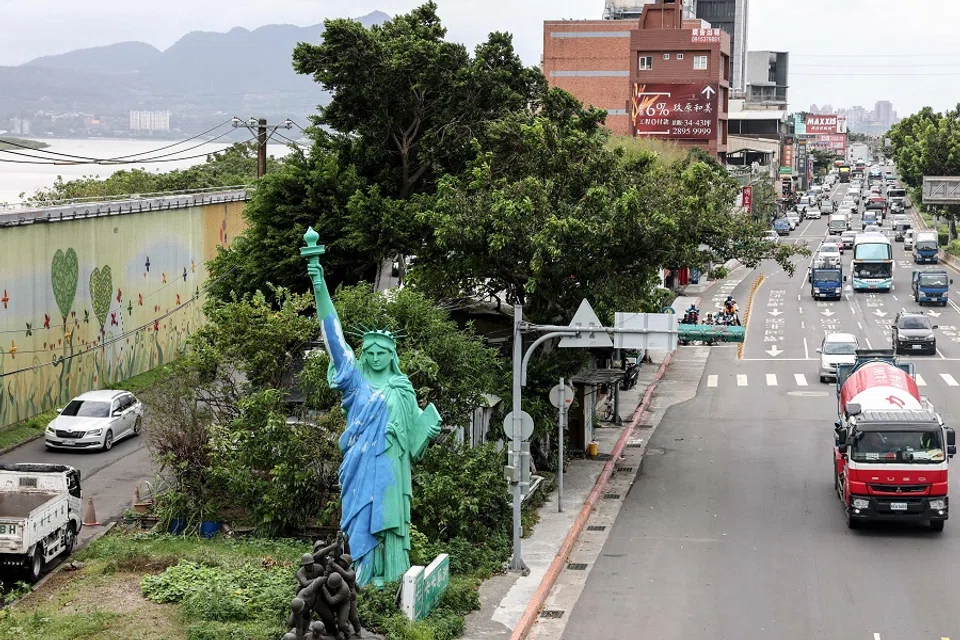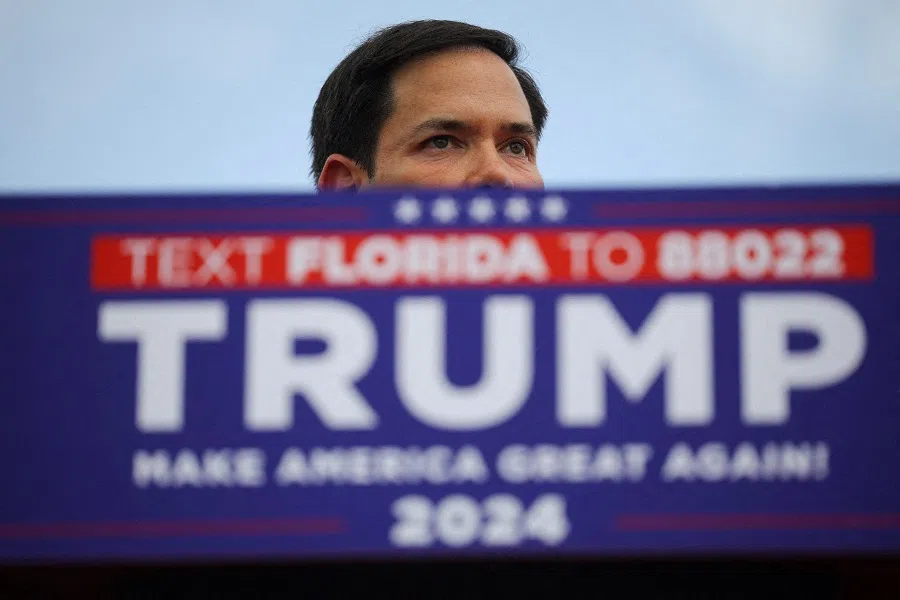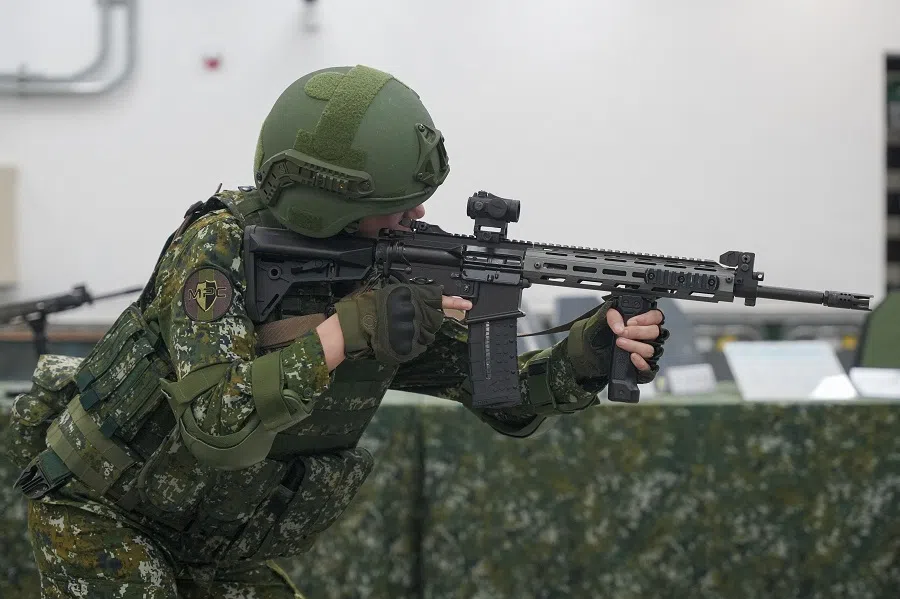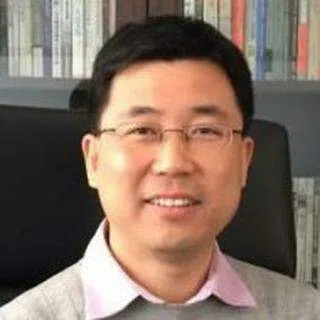What Trump 2.0 means for Taiwan
US President-elect Donald Trump’s mercurial stance on the Taiwan issue has been a source of anxiety for Taiwan. Though once seen as pro-Taiwan, he now views Taiwan as a freeloading competitor, which could prove detrimental for Taiwan’s security. However, it may be too early to tell which direction Trump’s Taiwan policies will take, says political commentator Qi Dongtao.

After winning his first presidential election, Donald Trump upended diplomatic norms by taking a congratulatory phone call from then Taiwan President Tsai Ing-wen, solidifying his maverick image globally. Upon taking office, he simultaneously launched trade, technology and public opinion battles against mainland China while significantly increasing arms sales to Taiwan.
This strong support from the Trump administration and Congress emboldened both the Tsai government and Taiwan’s anti-China pan-Green camp, who hoped for his reelection. His loss to Biden sparked fears within this camp that the new administration would be less hawkish on China and less supportive of Taiwan.
Taiwan has found its place within this [Biden’s] strategy and established a strong rapport with the US, but they now fear the pangs of a painful transition to a new strategy under Trump.
Taiwan increasingly wary of Trump
Now, facing Trump’s return to power, Taiwan’s Lai Ching-te administration appears more cautious, even apprehensive.
Why does Taiwan have reservations about a potential Trump 2.0, after four years of the Biden administration? Firstly, not only have the Biden administration and the US Congress been more effective in their anti-China and pro-Taiwan efforts than Trump, they have also been working with Taiwan and other allied countries to establish a long-term, stable and sustainable anti-China, pro-Taiwan strategy. Taiwan has found its place within this strategy and established a strong rapport with the US, but they now fear the pangs of a painful transition to a new strategy under Trump.
Secondly, Trump’s widely reported private and public remarks about Taiwan after the end of his first term have clearly shown that he did not value Taiwan’s strategic importance vis-a-vis the US, as Biden did. Instead, Trump sees Taiwan both as a competitor and as an ungrateful freeloader that undermines the US. With such a perspective, it is hard to imagine that Trump would be committed to developing a long-term, effective pro-Taiwan strategy, as Biden has done.
Taiwan’s value to the Biden administration
Taiwan held a key position in the Biden administration’s anti-China strategy for at least four reasons — all of which Trump currently does not appear to value.

The first reason has to do with military and security considerations. Taiwan is located at a critical point in the first island chain that the US leverages to contain mainland China. Losing Taiwan would lead to the collapse of this defensive line. Trump’s isolationist tendencies have led him to undervalue the use of military means to protect US interests abroad. During his term in office, Trump frequently boasted about not having initiated or participated in any wars. He sees the Russia-Ukraine war — which is of great concern to Taiwan — as a chip for negotiation.
... he [Trump] could temporarily consider mainland China a friend or Taiwan an enemy based on interests; everything is up for a trade, and there is no such thing as an unbreakable democratic alliance.
The second reason is economic in nature. For the US, Taiwan’s advanced semiconductor industry plays a crucial role in keeping mainland China in check when it comes to technological and economic fields. However, Trump saw Taiwan’s semiconductor industry as a competitor to the US. According to Trump, Taiwan’s success in the semiconductor industry not only shows that they are ungrateful for US protection, but also takes jobs away from Americans.
The third reason is an ideological one. Taiwan, as a model of Chinese democracy, is intrinsically valuable to the US because it unites allied countries in a war of public opinion against mainland China. However, Trump is often seen as a disruptor of democracy, freedom and human rights — his transactional style leaves little room for these Western mainstream values. In other words, he could temporarily consider mainland China a friend or Taiwan an enemy based on interests; everything is up for a trade, and there is no such thing as an unbreakable democratic alliance.
The last reason relates to US leadership among its allies. The Biden administration leverages the Taiwan issue to create a heightened sense of crisis among its allies. This sense of crisis facilitates unity and consolidates US leadership, serving US interests across political, economic and military domains.
As an isolationist, Trump is uninterested in the so-called democratic alliances. To him, allies are perhaps just the recipients of lower tariffs compared to rival nations. Apart from Israel, other allies seem less important to him and are not worth spending the extra effort on to strengthen unity and consolidate leadership. Thus, unlike Biden, Trump himself does not value the factors favourable to Taiwan, giving Taiwan ample reason to remain sceptical of him.
The future Trump administration: friend or foe?
However, Trump’s nominees in the state, national security and defence departments are all Republican establishment figures and pro-Taiwan China hawks, which may mitigate Taiwan’s concerns about him.

Senator Marco Rubio, his nominated pick for secretary of state, has been sanctioned twice by Beijing for his active stance against China on issues related to Xinjiang and Hong Kong. Over the past few years, he has consistently championed various pro-Taiwan bills in Congress and — having met with both Tsai and Lai — is considered one of the most staunch supporters of Taiwan in US politics.
Meanwhile, representative Michael Waltz, Trump’s nomination for national security adviser, has a military background and sees China as the biggest threat. A member of the House China Task Force, he has championed numerous anti-China policy recommendations. His involvement in the Taiwan Caucus, where he actively promotes pro-Taiwan legislation and advocates for rapidly arming Taiwan as a key deterrent against China, further underscores this stance.
Lastly, television presenter Pete Hegseth, nominated for defence secretary, also has a military background and thinks that the purpose of China’s military development is to defeat the US. After the outbreak of the Russia-Ukraine war, Hegseth felt that Taiwan should deter the mainland from taking military action by actively preparing for war, as such preparations would increase the cost of military action for mainland China.
For the mainland, Trump’s isolationism, transactional approach and unpredictability provide grounds for promoting “US scepticism” (疑美论) and offers opportunities for the mainland to improve relations with US allies, and even Taiwan.
Is there still hope for a peaceful resolution to the Taiwan issue?
How might these pro-Taiwan China hawks continue to effectively support Taiwan under a president who appears willing to use Taiwan as a bargaining chip? This is a matter of concern for both Taiwan and mainland China.
When Biden took office four years ago, he did not significantly abandon the anti-China, pro-Taiwan policies from the Trump era but instead intensified these efforts, particularly by increasing joint actions with allied nations.
If Trump continues to build upon rather than discard Biden’s policies when he takes office, it would likely provide reassurance to Taiwan and other allies. However, Trump has always used his unpredictability as a key strategy to gain an advantage in negotiations, so no one can be certain that he will do so.

For the mainland, Trump’s isolationism, transactional approach and unpredictability provide grounds for promoting “US scepticism” (疑美论) and offers opportunities for the mainland to improve relations with US allies, and even Taiwan. If Trump is indeed able to facilitate a swift end to the Russia-Ukraine war, it would create conditions for improved relations between China and the EU. Will Beijing seize this opportunity and adopt a softer approach to improve its situation in the West?
More importantly, the anti-China, pro-Taiwan policies of Biden and the Democratic Progressive Party have also forced mainland China to intensify its preparations for military conflict, to the point that its efforts to promote a peaceful solution on Taiwan have been largely overlooked. Instead, external attention has become fixated on the mutual deterrence between the US, China and Taiwan, making the thought of a peaceful resolution to the Taiwan issue seem increasingly laughable.
If this situation continues, the prospects for a peaceful resolution to the Taiwan issue are looking increasingly bleak. However, if Trump does reduce his involvement in the Taiwan issue, the ensuing space created for Taiwanese and Western public discourse might facilitate negotiations for a potential solution.
This article was first published in Lianhe Zaobao as “特朗普2.0下的台湾问题”.


![[Big read] When the Arctic opens, what happens to Singapore?](https://cassette.sphdigital.com.sg/image/thinkchina/da65edebca34645c711c55e83e9877109b3c53847ebb1305573974651df1d13a)


![[Video] George Yeo: America’s deep pain — and why China won’t colonise](https://cassette.sphdigital.com.sg/image/thinkchina/15083e45d96c12390bdea6af2daf19fd9fcd875aa44a0f92796f34e3dad561cc)